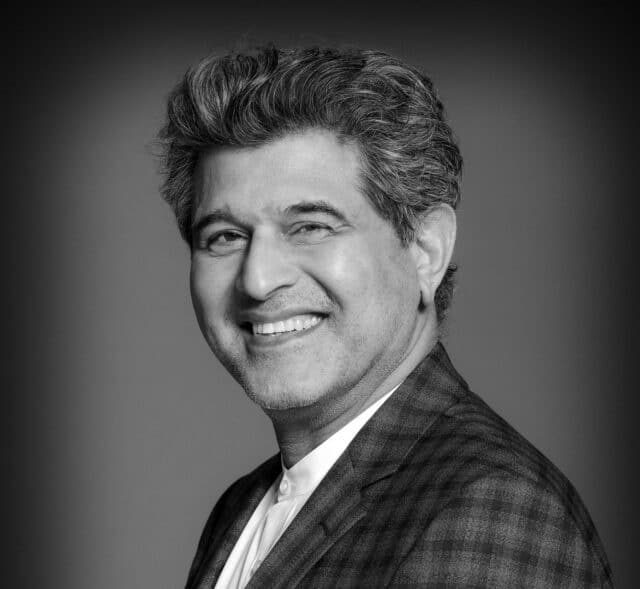
A Vision for Success
Sheraz Daya, world-renowned ophthalmologist, established the Centre for Sight UK in 1996. Director and Consultant Ophthalmic Surgeon of the Corneo Plastic Unit and Eye Bank at the Queen Victoria Hospital NHS Trust, Sheraz Daya, performed the first LASIK laser vision correction procedure in the UK in 1995. Sheraz has pioneered a number of ground-breaking techniques in eye surgery and is a leading authority on stem cell transplantation of the eye surface. He is a key opinion leader for the international ophthalmic industry and has many awards and publications to his name. He is married to Marcela Espinosa, also a leading eye surgeon, and they have two children both currently at medical school.
What are your fondest memories of your school days and what did Bloxham teach you?
I felt the beginnings of a personal liberation coming to Bloxham after being at an unreasonably strict boarding school for children of missionaries in India. When I was asked to speak at Founderstide about my memories of Bloxham, the first thing that came into my mind was music. Every study had music blaring from a variety of hi-fi sets. The era of punk rock began during that time, and although a bit outrageous, was acceptable and that resonated with me – it was fine to think and behave differently. It was liberating and started me on the journey that enabled me to become ambitious. The influence of the educators at Bloxham was phenomenal and resonated and led me to choose Medicine as a career.
At 18 did you know what you wanted to do?
Yes – I wanted to read Medicine at university but as a foreign student had a difficult time getting a place. Medicine attracted me as it was a profession with considerable possibilities that would have a direct impact on people.
Where did you go after Bloxham?
I gained a place at the Royal College of Surgeons in Ireland and moved to Dublin. I qualified with an honours degree and spent a year in Belfast as a house officer at the Royal Victoria Hospital at the peak time of the ‘troubles’. This was a valuable experience where I learnt a great deal about people – seeing the best and worst of them in times of conflict. I then moved to New York. Again, like Medicine, I could not get a place to train in Ophthalmology, my chosen speciality. Instead, I trained in Internal Medicine and during that time, between doing research at the weekends and networking, I managed to get an ophthalmology training position in Brooklyn and Queens. I then returned to New York, spent a couple of years in practice on Madison Avenue and in Queens before returning to the UK in 1994.
What advice would you give students for success in life after Bloxham?
First, strive for excellence in whatever you do. I do not meant perfection, that is as bad as being mediocre. Whatever you do, give it your best. Second, carefully choose the company you keep – take a look at the characteristics of people you admire and try to adopt them. By the same token, take note of what you do not like and ensure you eliminate these features from yourself.
What is the best piece of advice you have been given?
“Qui cum canibus concumbunt cum pulicibus surgent” translated “If you sleep with dogs, you will wake up with fleas”.
Who has been an inspiration to you?
While training in New York, the Chairman of the Ophthalmology residency program, David Paton MD, was very well known having set up the flying eye hospital, Orbis, amongst many other accomplishments. He was a great mentor and exemplary individual who just did not tolerated mediocrity. In Minneapolis I was mentored by two very well-known eye surgeons, Edward J Holland and Richard L Lindstrom, who inspired and influenced me to strive for more.
A Buddhist Abbot in Burma has also been a great inspiration. Despite living as a Buddhist with all its simplicity, his true desire to have impact has meant that he has managed to accomplish so much. He has established numerous monasteries internationally, a large Buddhist university, as well as a network of eye and healthcare establishments throughout the country – truly living the noble path.
What are your proudest professional achievements?
I came to the UK to head an ailing NHS department. Not having worked in the NHS – some might say I was naïve – I set about radically changing the unit with considerable cutting-edge developments in the specialty of Cornea and Oculoplastics. Through recruitment of incredible colleagues, it has become well-known internationally and has trained numerous eye surgeons, many of whom are now in prominent positions. Concurrently establishing Centre for Sight, a private organisation, almost 30 years ago was unheard of and equally ambitious. I am please that we have been an inspiration to many colleagues who have followed in our footsteps. Academically, pioneering work in the area of stem cell and tissue engineering, as well as laser eye surgery, are accomplishments that have had considerable impact and for me are areas I am particularly proud of.
Back to all stories

